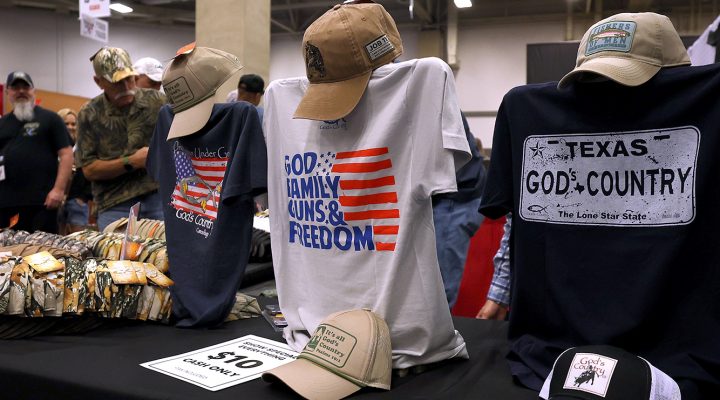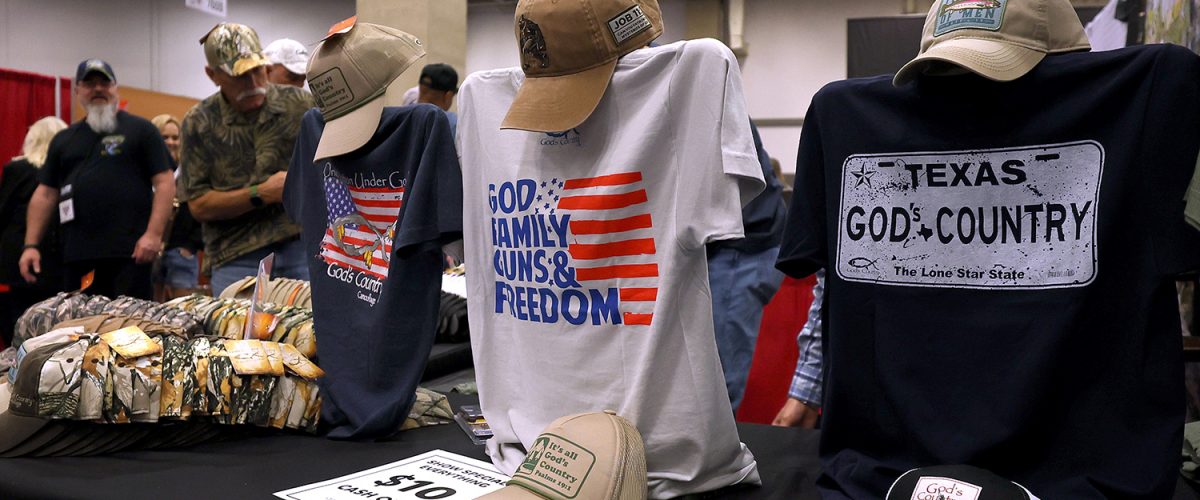In 2018, I did something most people wouldn’t dare do. While making a play about guns in America, I took a group of high school students to the NRA annual meeting in our hometown of Dallas.
What we saw and experienced there changed the course of my life. Christian nationalism wasn’t just on display — it was the air the attendees breathed and the water they drank. You couldn’t walk anywhere without hearing about how God wants armed citizens.
Even at the Prayer Breakfast, retired first baseman Adam LaRoche ripped off his sweatshirt to reveal a T-shirt that read, “Jesus loves me and my guns,” and the crowd shouted “Amen!”
It was in the midst of this weekend that I felt called to some sort of public ministry speaking out against Christian nationalism.
“It was in the midst of this weekend that I felt called to some sort of public ministry speaking out against Christian nationalism.”
Six years later, I just graduated from seminary on May 11. One week after graduation I attended the NRA annual meeting again in Dallas. This year was the first time the NRA had been to my hometown since 2018, and I wanted to see how America’s most powerful gun-lobby group has changed and how it hasn’t.
I spent the weekend of May 17-19 participating in workshops, walking around the exhibit hall and attending a Trump rally and the Prayer Breakfast. The NRA of today is a very different organization than it was six years ago, and that is a good thing. But the American public must continue to hold the organization accountable for the damage they have done to our democracy and for the obstacles they continue to present in creating a safer society for all.
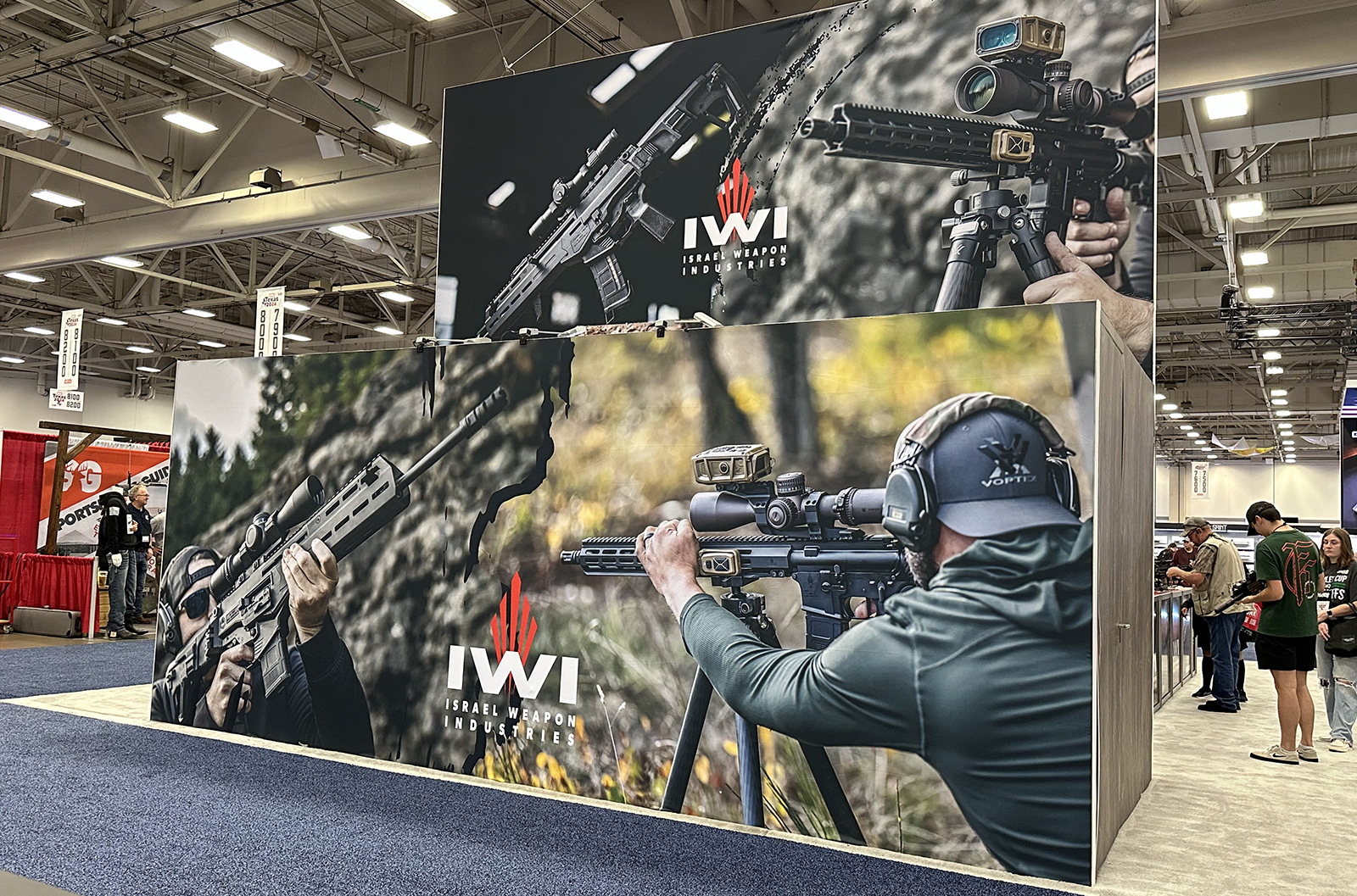
Exhibit hall at NRA convention 2024 (Photo by Mara Richards Bim)
The NRA of 2018
The last time I attended the NRA meeting in Dallas, Donald J. Trump was president. Mid-term elections were just months away, and Republican politicians and operatives, who historically received big campaign donations from the NRA, were out in full force. It was also just months after the Parkland, Fla., school shooting and the Sutherland Springs church shooting in Texas.
The first day of the 2018 meeting was a Friday and the Kay Bailey Hutchison Convention Center was packed for a political rally. The rally (or, as they called it, “The NRA Institute for Legislative Action Leadership Forum”) featured a who’s who lineup of unabashed Christian nationalists including:
- Trump who, in his 2024 run for office, is going all-in on the fusion of Christian and nationalist imagery and his longstanding status as a messiah figure for Christian nationalists.
- Texas Gov. Greg Abbott, whose nine-year tenure as governor has made Texas the epicenter of the Christian nationalist movement.
- Texas Sen. Ted Cruz, whose father is a leader in the Christian dominionism movement, and who is one of the main players advancing Christian nationalism in Texas.
- A then-unknown Mark Robinson, who, with the NRA’s backing, is now the lieutenant governor of North Carolina running to be the state’s next governor. Although he is a Black man, Robinson rose to power by parroting often-racist, homophobic, Christian nationalist rhetoric of white supremacists and is currently running one of the most far-right campaigns in the country.
- Then-governor and now Nebraskan senator Pete Ricketts who regularly defends Christian nationalism as the “American way of life.”
- Wayne LaPierre, then-NRA CEO, whose 30-year leadership of the NRA mainstreamed the idea that the Second Amendment is handed down by God.
- Matt Schlapp, chairman of the American Conservative Union, responsible for the annual Conservative Political Action Conference meeting, a right-wing, Christian nationalist.
- Charlie Kirk, founder of Turning Point USA, a Christian nationalist program on high school and college campuses that advocates Christian supremacy and seeks to dissolve the separation between church and state.
- Mark Geist, former Marine-turned-spokesperson for the We the People Bible, a Christian nationalist edition of the Bible that predates the recent one being hocked by Donald Trump.
Included in the speaking lineup were enablers who aren’t necessarily Christian nationalists themselves, but whose rhetoric is often used by Christian nationalists to advance their cause. They included:
- Then-Vice President Mike Pence, who attributed Trump’s presidency to being God’s will and famously substituted “Old Glory” for “Jesus” when quoting Scripture in his 2020 Republican National Convention speech.
- Texas Sen. John Cornyn, who is one of the few Republicans committed to bipartisan talks on issues like guns, but who also often side-steps difficult questions that would put him at odds with his Christian nationalist peers in Texas and in Congress.
- Then-NRA spokeswoman and political provocateur Dana Loesch, frequent CPAC speaker and anti-feminist/Christian complementarian who consistently advocates for Christians waging armed conflict to ensure Christian, right-wing domination in the United States.
- Then-NRA political strategist Chris W. Cox, who was behind the now-defunct NRA TV, which brought Christian nationalist rhetoric to millions of subscribers.
In 2018, Friday’s rally set the stage for the rest of the weekend. The imagery and rhetoric of Christian nationalism were everywhere, and nowhere more prominent than at the Prayer Breakfast.
In the ballroom at the Omni Hotel, attendees gathered to celebrate the fusion of God, country and guns. Over $40-per-plate breakfasts, attendees listened as speaker after speaker called upon a John Wayne-version of Jesus to harm those who would dare oppose the attendees’ God-given right to guns. One attendee, in an interview with the Washington Post, summed up the sentiment in the room, “It’s about God, country and the protection of our freedoms. We don’t think we can be good Americans without this core value of Christian faith in Christ that gives us our freedoms of everything, and that’s what the NRA is.”
The opening prayer, offered by one of the NRA’s $1 million donors, set the tone of the event: “Lord, we put our faith and trust in you and not in governments or militaries or our own technology or even the strength of our own arms. Still, we humbly ask you to direct and bless our efforts against those who would seek to take away those freedoms. Empower us to protect the peace of our homes and ensure the safety of those defending the homeland overseas and deliver us from despots of tyranny.”
Adam LaRoche gave his personal testimony that included a point about Jesus not being a pacifist. LaRoche pointed to Mathew 10:34 to say Jesus was, in fact, a warrior who said, “I did not come to bring peace, but a sword.” Hence LaRoche’s T-shirt proclaiming, “Jesus loves me and my guns!”
Retired Marine Corps Lt. Col. Oliver North delivered the keynote address. The incoming president of the NRA projected an image of small-town America with his homespun tales of teaching each of his 17 grandchildren to turn to the Bible and learn to shoot a gun. In the end, he warned that good NRA Christians are in the fight of their lives: “We’re in a brutal battle to preserve the liberties that the good Lord presents us.”
Susan Howard, who found fame on the television show Dallas, offered the closing prayer. Pointing to the upcoming midterm elections, she prayed that the God of the Israelites would meet the Democratic Blue Wave coming with the rising waters of the Red Sea. Like the Egyptians who were washed away to their deaths, so the Democrats, the liberals, the “enemies of America,” should be wiped out, she implored.
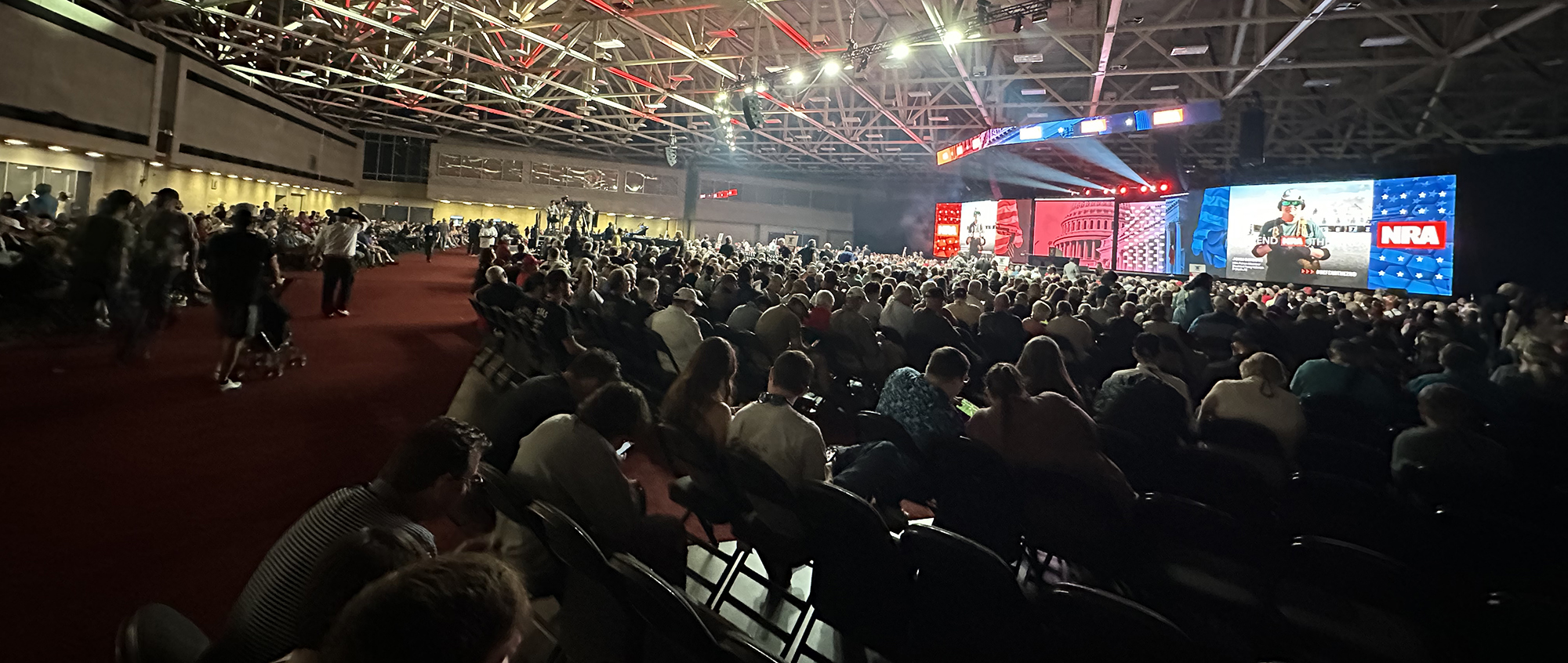
Trump rally at NRA 2024
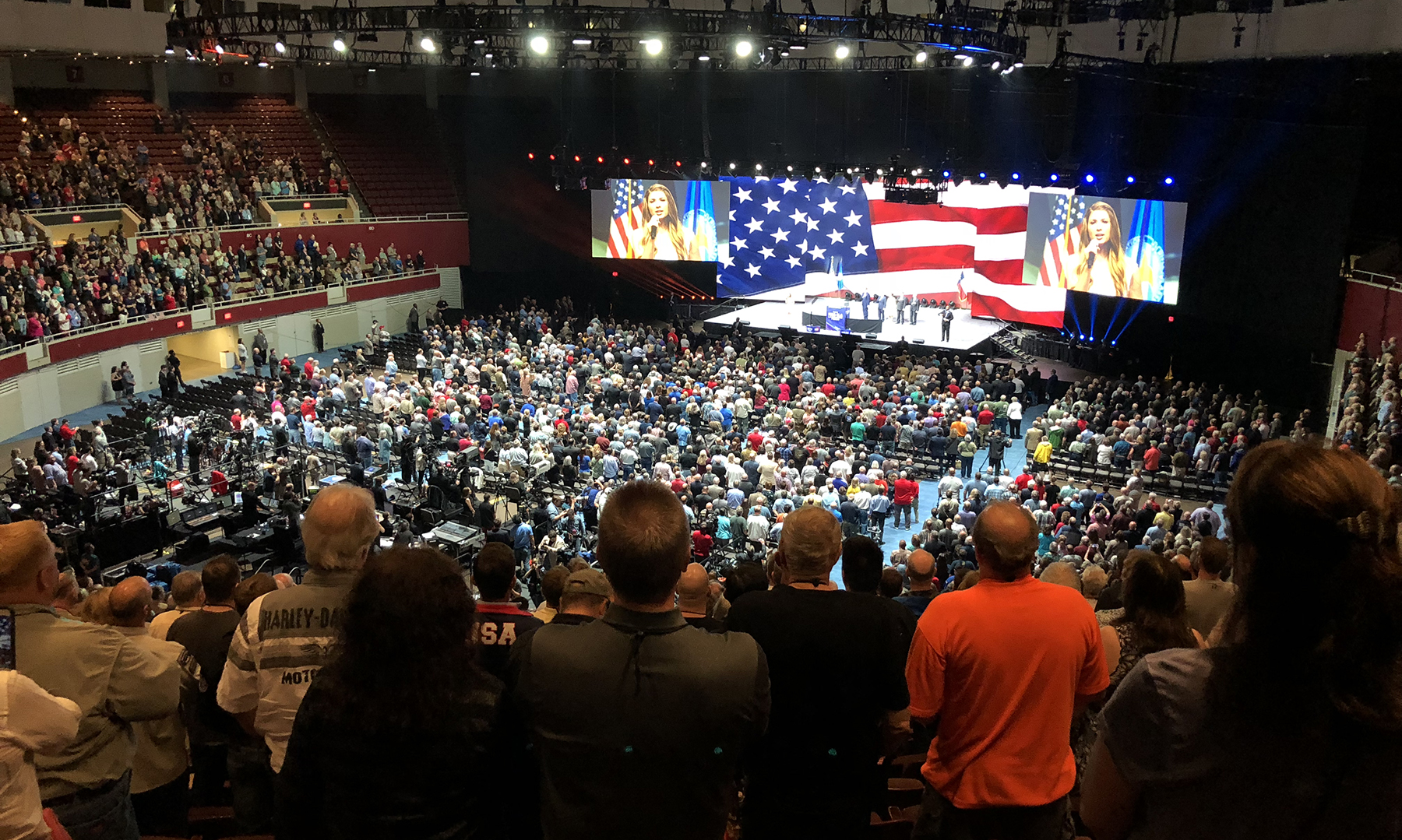
Trump rally at NRA 2018
The NRA’s legal woes
Over the last several years, the NRA has faced mounting legal scrutiny. Just two months after the 2018 annual meeting, Americans learned that Russian spy Maria Butina had been schmoozing NRA bigwigs at the meeting. After Butina pled guilty to “conspiracy as an unregistered foreign agent,” it came out that the leadership of the NRA had been aware for years that Russia was using its ties to the gun lobby group to access American politicians.
Then, in 2019, the newly elected NRA president, North, accused CEO Wayne LaPierre and others at the organization of financial impropriety. North was forced out but later was vindicated when New York Attorney General Leticia James brought a lawsuit against the NRA in 2020. The New York-based NRA was accused of violating nonprofit laws and misusing millions of dollars to pay the personal expenses of LaPierre and others.
From 2020 until 2024, the NRA attempted to file for bankruptcy and reform as a nonprofit in Texas. The bankruptcy filing was dismissed as having not been filed “in good faith.” LaPierre stepped down before the trial began. In February 2024, a Manhattan jury found that the defendants — LaPierre, ex-board treasurer Wilson Phillips, current general counsel John Frazer, and the NRA itself — were all guilty of corruption.
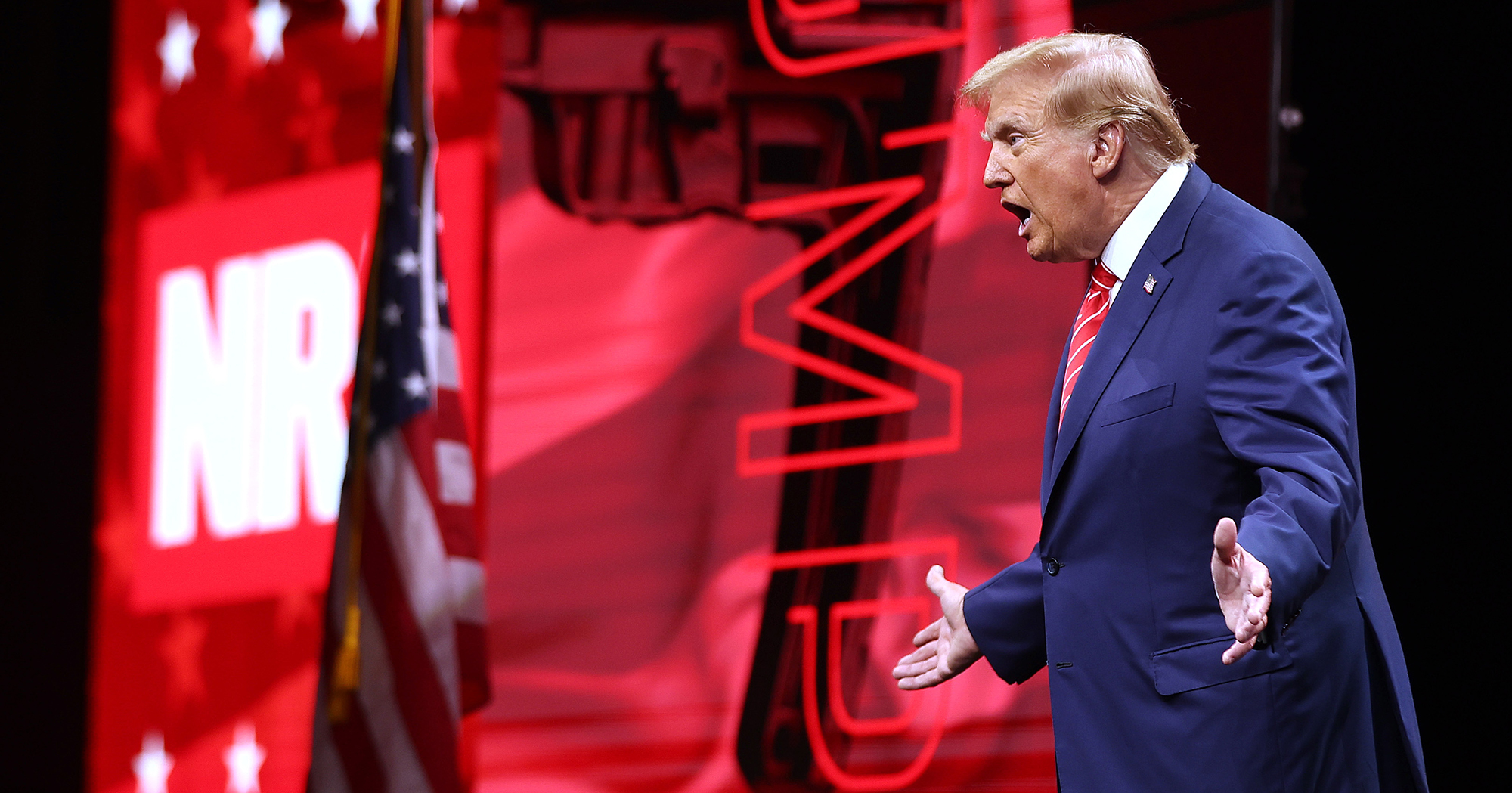
Donald Trump speaks during the NRA ILA Leadership Forum at the NRA convention at the Kay Bailey Hutchison Convention Center on May 18, 2024, in Dallas. (Photo by Justin Sullivan/Getty Images)
The NRA of 2024
This year, when I walked into the Kay Bailey Hutchison Convention Center, I was prepared to be assaulted with the imagery and rhetoric of Christian nationalism. However, the first thing I noticed, was how meager the attendance was. The second thing I noticed was the age and physical limitations of the attendees.
This year’s convention-goers were noticeably older than those of the 2018 meeting. And a striking number of them used mobility scooters to get around.
I attended several workshops on Friday. The workshop leaders faithfully delivered the longstanding NRA talking points. They include “the world is a dangerous place;” “even your own home is not safe;” “you must protect your family;” and “the liberals are coming for your guns.”
The Christian nationalist imagery and rhetoric had toned down dramatically. There were still a few workshop leaders who used the language of spiritual warfare to frame the fight between those in attendance and “the liberals,” an amorphous group that includes anyone — even gun owners — who thinks there are some people who should not have such easy access to guns.
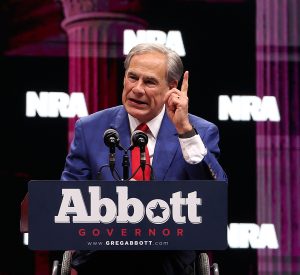
Texas Gov. Greg Abbott speaks during the NRA ILA Leadership Forum May 18, 2024, in Dallas, Texas. (Photo by Justin Sullivan/Getty Images)
On Saturday, I attended the 2024 rally (or The NRA Institute for Legislative Action Leadership Forum) to again hear Trump speak. I was shocked by how small the audience was compared to the one in 2018 — roughly 20% of the audience size the first time I’d attended this event. Gone, too, was the lineup of vocal Christian nationalists. The only speakers in 2024 were Texas Gov. Greg Abbott and Trump.
It was a younger audience gathered for the event than I’d seen motoring around the convention center the day before. The organizers kept the audience waiting for more than an hour and at one point said that Trump was “busy doing media interviews backstage.” The audience booed.
Gov. Abbott spoke for just a few minutes before ceding the stage to Trump, who droned on for one hour and 45 minutes. There were a few moments that really engaged the crowd, but at the hour-mark, with no end in sight, many in the audience made a mass-exodus. Just a few hundred stayed to the bitter end.
On Sunday, I attended the NRA Prayer Breakfast. Again, the crowd size was considerably smaller than that of 2018. Most surprising to me, though, was the total absence of Christian nationalist rhetoric. In fact, there was no mention from the stage of politics or government or guns at all.
The keynote speaker this year was former country music singer Granger Smith (known previously by his stage name Earl Dibbles Jr.) Smith left the music industry after losing his 3-year-old son in a tragic pool-drowning accident. Smith is currently pursuing a master of divinity degree at Southern Baptist Theological Seminary in Kentucky while serving a local church.
Smith grew up in Lake Highlands, a neighborhood in North Dallas, where he was well known. He attended Texas A&M University and was a member of the Corps of Cadets there.
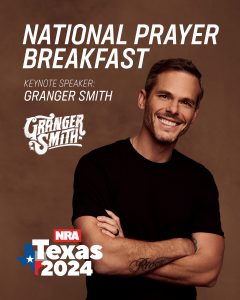 While Smith and I hold different theological positions on a number of issues, we both agree Christian nationalism isn’t biblical. I was particularly impressed by his willingness in his sermon to challenge the Christian nationalist audience to actually read their Bibles and turn off Fox News (a comment that landed like one might expect with that crowd).
While Smith and I hold different theological positions on a number of issues, we both agree Christian nationalism isn’t biblical. I was particularly impressed by his willingness in his sermon to challenge the Christian nationalist audience to actually read their Bibles and turn off Fox News (a comment that landed like one might expect with that crowd).
After the Prayer Breakfast, I attended one last workshop titled “Riot and Violent Protest Survival.” The workshop was of the type I had heard repeatedly in 2018 but stood out at this NRA meeting because the other workshops I’d attended had seemed so much more reserved.
The NRA has changed over the past six years, but there are still remnants within the organization that perpetuate narratives dangerous to our democracy. I was relieved to see and hear more about hunting and sport-shooting at this year’s meeting, but there are still elements of the organization intent on using scare tactics to get people to buy and use guns against fellow citizens.
I’m under no illusion that the NRA’s reforms are because of a sudden altruistic bent. They are hemorrhaging money and members and are embedded in an industry that is being forced to change, even if slowly.
So what changed?
I believe we are seeing a shift in the NRA and in the gun industry at large, thanks to the families of Sandy Hook Elementary School. In 2022, the gun manufacturer Remington settled a lawsuit brought by the families over how the manufacturer had marketed its Bushmaster XM15-E2S rifle used in the school shooting.
The $73 million settlement was the first large settlement by a gun manufacturer since the passage of the 2005 “The Protection of Lawful Commerce in Arms Act” that has, until recently, shielded gun makers from liability when their weapons are used in mass shootings. The lawsuit hinged on Remington’s marketing that appealed to “so-called couch commandos and troubled young men” in direct violation of Connecticut’s consumer protection laws. Since Remington’s settlement with the Sandy Hook families, 10 states have enacted laws that expand the ability of the public to bring civil lawsuits against firearm companies.
Another important legal case is that of the Sandy Hook families versus right-wing conspiracy theorist Alex Jones. In 2022, separate juries in Texas and Connecticut found the Texas-based Jones liable for defamation and ordered him to pay a total of $1.4 billion dollars in damages to the families for perpetuating the conspiracy that the Sandy Hook tragedy was a hoax. While Jones continues his attempts to evade the penalties, the cases are high-profile examples of a right-wing conspiracist being held accountable for knowingly spreading disinformation.
Taken together, these cases demonstrate that right-wing conspiracies spread by individuals steeped in fantasies about civilian warfare can be held to account.
I also can’t help but wonder what role the January 6 riot with its displays of Christian nationalism has played in how the NRA goes about doing its business. While some politicians like Marjorie Taylor Greene and Lauren Boebert have embraced the label to appeal to their bases, organizations like the NRA rely on public support. With the NRA’s image in tatters following the recent corruption verdict, might the organization want to steer clear of the appearance of being involved with armed Christian nationalists?
At the Prayer Breakfast, my presence (with my camera and microphone) clearly made NRA’s security team very nervous. They continually walked back and forth in front of me, one after the other, eyeing me up and down. I did not have a press badge — I had paid to attend as a member and clearly displayed my member badge. I wasn’t being disruptive, so there was little they could do.
Yet my impression of the event and the whole weekend was of a nervous organization trying to figure out how to stay afloat. I certainly hope that is the case. The NRA and organizations like it have fueled the threats to our democracy that we have seen play out over the last few years. The American public must continue to hold them accountable.

Mara Bim
Mara Richards Bim is serving as a Clemons Fellow with BNG. She is a recent master of divinity degree graduate from Perkins School of Theology at SMU. She also is an award-winning theater practitioner, playwright and director and founder of Cry Havoc Theater Company that operated in Dallas from 2014 to 2023.
Related articles:
What do George Floyd and Kyle Rittenhouse have to do with armed civilian combat? Evidently, quite a lot | Analysis by Mara Richards Bim
T-shirts send a message about gun violence

